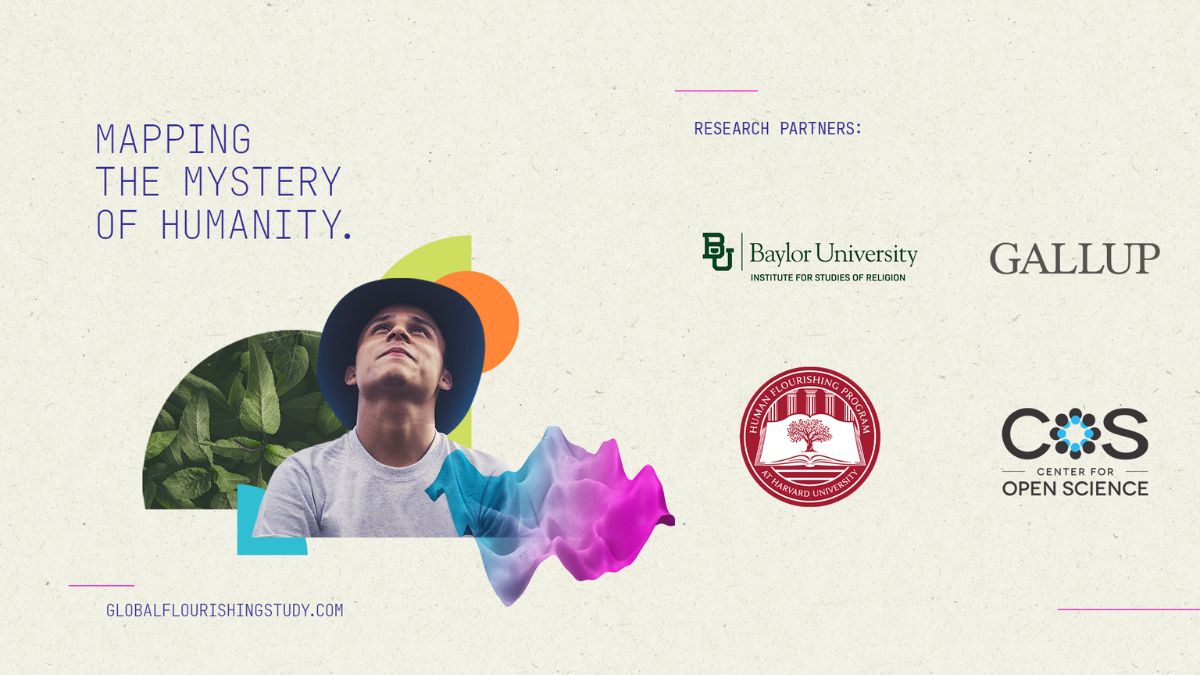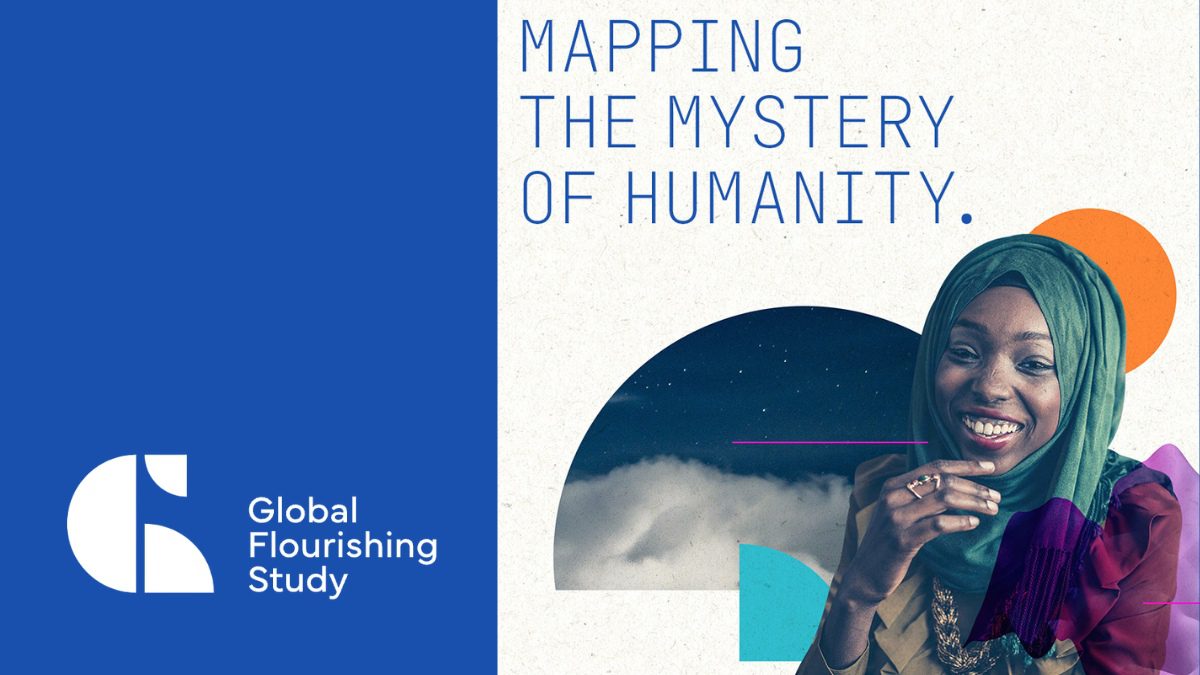It was the last day of April and springtime was in full swing in Washington, D.C. Inside the historic Great Hall of the Gallup Organization’s world headquarters, cut tulips and lilies bloomed from bud vases set on conference tables facing the stage. The room buzzed with activity, even as the gathered group of students, educators, journalists, nonprofit and business leaders checked their phones and hot-off-the-printer handouts for the latest headlines: “A Global Flourishing Study Finds That Young Adults, Well, Aren’t” (The New York Times); “How to flourish –– even when you aren’t at your happiest, according to research” (CNN); and “Why we need to measure people’s well-being—lessons from a global survey” (Nature).
There were more — the Nature commentary part of a wave of over 30 simultaneous journal publications timed to the first release of analysis from the Global Flourishing Study, a first-of-its-kind five-year longitudinal survey that is asking more than 200,000 participants in 23 diverse countries and territories a set of carefully calibrated questions to help scientists study what contributes to a life well-lived.
Planned by researchers at Harvard and Baylor, with assistance from the Center for Open Science, and surveys carried out by the polling experts at Gallup, the Global Flourishing Study uses carefully calibrated questionnaires to gather baseline and, in the coming years, longitudinal data across six identified dimensions of well-being: happiness and life satisfaction; mental and physical health; meaning and purpose; character and virtue; close social relationships; and financial and material stability.
With the release of a wave of analyses from the first year of interviews, the survey offers a unique opportunity to offer both a granular look at how people are doing in individual countries and cultures, as well as the chance to make cross-cultural comparisons to see when and where categories of people are struggling or thriving.
YOUTH, MONEY, AND RELIGION
Tyler VanderWeele, the epidemiologist who co-led the project as director of Harvard’s Human Flourishing Program, told the crowd that while the initial survey results had confirmed many established findings — that average levels of flourishing tend to increase with age, and that in most contexts married individuals and people with jobs report higher levels of flourishing than single people and the unemployed — perhaps the most notable surprise was the extent to which young people are struggling
“When we combine across these six dimensions of well-being, the results are perhaps not what one might have guessed,” VanderWeele said. “Earlier work focused on life satisfaction and life evaluation had suggested more of a U-shaped pattern, with younger individuals and older individuals reporting higher levels of flourishing.
What seems to be the case is that over time, the left part of the U has been flattening, and people are not doing as well as they used to be.”
Money, like youth, may not be the contributor to happiness that people sometimes assume it is: according to the survey, the countries that showed the highest average flourishing scores tended to be middle-income nations. “We actually find a negative correlation between GDP per capita and meaning in life,” VanderWeele said. “I think this raises important questions with regard to how we can carry out economic development in ways that don’t compromise meaning, purpose, character and relationships.”
The survey’s findings on the associations between people’s current and previous religious activity and present flourishing, meanwhile, are compelling if perhaps ill-suited to large-scale policy solutions. “People usually don’t make religious commitments on the basis of empirical statistical data analysis,” VanderWeele said, “but I think one might see the research as in some sense an invitation for those who already positively identify with a particular religious tradition.”
OPENING UP THE FRAMEWORKS
VanderWeele was joined onstage by two panels that worked to explore the science behind the Global Flourishing Study and its findings’ implications. Tim Errington, a senior director of research for the Center for Open Science, explained the importance of the survey’s approach. The researchers are available for interested researchers worldwide, with the primary requirement being that they pre-register their hypotheses before receiving access to the data, to help ensure that everyone’s analyses are honest (resisting temptation to cherry-pick relevant data) and able to be tested and replicated by outsiders. “It’s important to do that before you see the outcome. That’s how we have confidence in the outcome,” Errington said.
“We do not control what we find; we only control what we can ask and how we go about the question.”
The survey’s leaders believe the size, rigor and openness of the survey methods and results will allow other teams to dig into the data to surface insights for specific cultural and demographic contexts. “We’re coming at this with our own set of perspectives and priorities,” VanderWeele told one of the panels, “but we want people around the world to make use of it and to share their own insights into flourishing.”
Another panelist, Moitreyee Sinha, the founder of citiesRISE, a global mental health policy advocate, spoke of the importance of building an inclusive “knowledge architecture” that works to track often under-measured aspects of human well-being like cultural activities, connection to nature and spiritual practices, all of which can be “accelerators of the transcendent” as people move towards flourishing lives.
Eleanor Allen, whose World Flourishing Organization is a research partner for the survey, talked about the ways in which the flourishing framework can be applied in the workplace — her organization is already using aspects of the survey questionnaire to help managers and employees understand how to cultivate flourishing. “When you get it right, it feels really good,” Allen said. But that feeling also lends itself to more traditional business metrics as well: “When we can get this right it’s a huge return on investment,” she said, “If we have less turnover and we have more engaged people and higher productivity, everyone benefits.”
A CALL TO COME TOGETHER
Byron Johnson, who co-leads the survey and is the director of the newly-created Institute for Global Human Flourishing at Baylor University, highlighted the importance of “communities of practice” for increasing flourishing. It was an intentional approach the research group itself applied in their own collaboration, and something Johnson has seen at work in places where he has done deeper research on aspects of human flourishing, from planned communities in Georgia to a death-row church at the Mississippi State Penitentiary.
“The issue of relationships is phenomenally important. I do think it’s something that doesn’t take rocket science to think we could address this issue,” Johnson told the event’s final panel. “The data seem to be pretty clear. I don’t think you can flourish in isolation.”
Johnson emphasized that the launch of the Global Flourishing Study should be seen as not merely a celebration but an invitation. “It’s just the beginning of a dialogue and discussion of what it means to flourish,” he said in his opening remarks. “We don’t pretend that we have figured it out — we haven’t. We want to understand flourishing and we want to understand it with you.”
STILL CURIOUS?
Read more about the Global Flourishing Study, pre-register a hypothesis to Access the Data, or explore the dozens of articles published in the first wave of research on topics ranging from optimism and forgiveness to childhood predictors of adult belief in God.


